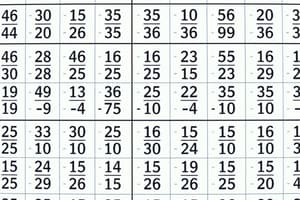Podcast
Questions and Answers
What is a primary benefit of using multiplication radicals?
What is a primary benefit of using multiplication radicals?
- They simplify large calculations into an understandable format. (correct)
- They eliminate the need for the distributive property.
- They create a linear relationship between the numbers multiplied.
- They allow for straightforward multiplication without approximations.
Which property applies to multiplication radicals in terms of number order?
Which property applies to multiplication radicals in terms of number order?
- The order of numbers does not affect the result. (correct)
- The result changes based on the order of multiplication.
- Only specific sequences yield valid outcomes.
- Same order must be maintained for correct results.
In which field are multiplication radicals commonly applied?
In which field are multiplication radicals commonly applied?
- High school geometry.
- Higher-level mathematics and complex analysis. (correct)
- Elementary arithmetic.
- Basic financial calculations.
How do multiplication radicals relate to the distributive property?
How do multiplication radicals relate to the distributive property?
What is a common misconception about multiplication radicals?
What is a common misconception about multiplication radicals?
Flashcards
Multiplication Radicals
Multiplication Radicals
A process of multiplying a large number of numbers together, especially useful when dealing with very large numbers or for maintaining precision in calculations.
Properties of Multiplication Radicals
Properties of Multiplication Radicals
There are no specific rules for the numerical products themselves in multiplication radicals. The length of the radical doesn't directly influence the result.
Commutative Property
Commutative Property
The order of the numbers being multiplied within a multiplication radical doesn't affect the result.
Practical Applications
Practical Applications
Signup and view all the flashcards
Representing Complex Numbers
Representing Complex Numbers
Signup and view all the flashcards
Study Notes
Introduction to Multiplication Radicals
- Multiplication radicals represent a process for multiplying a large number of numbers together.
- The process is significantly useful for calculating products of numbers that are too large to multiply in a straightforward manner, while maintaining reasonable precision.
Properties of Multiplication Radicals
- Multiplication radicals do not have specific rules that directly apply to the numerical products, unlike standard multiplication.
- There is no direct relationship between the length of the radical and the result of the multiplication of the numbers written within; this differs from a linear relationship.
- The value of the radical symbol itself doesn't change the mathematical operations.
- The order in which numbers are multiplied within a multiplication radical expression does not affect the result.
- The distributive property of multiplication still applies, even with large numbers within a multiplication radical.
- Multiplication radicals maintain the commutative property of addition and multiplication; the order of the numbers in the expression doesn't change the result.
Practical Applications of Multiplication Radicals
- Multiplication radicals are not frequently used in daily calculations.
- Such expressions are frequently encountered in higher-level advanced mathematical and scientific fields, like complex analysis or probability calculations.
- Complex numbers are often presented using such expressions as they are used to represent the relationship of large quantities multiplied together.
- Used to represent compound interest or exponential growth in financial mathematics and similar areas.
- Finding the product of many numbers, multiplication radicals concisely convey large calculations in a format that is easier to understand than writing it out in full.
- Finding a very close approximation for the result is possible for numbers with decimals or fractions.
Studying That Suits You
Use AI to generate personalized quizzes and flashcards to suit your learning preferences.
Description
Explore the fascinating world of multiplication radicals and their properties. This quiz covers how multiplication radicals facilitate the multiplication of large numbers while maintaining precision. Furthermore, you will learn about the lack of specific rules for these radicals and how the distributive property still applies.




